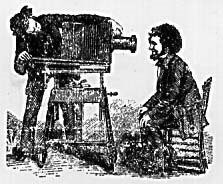The reading for this course will often consist of critical and sometimes theoretical texts. While the number of pages will be substantial, the main challenge will come from the content: these texts will often be difficult. I will provide you with resources to assist you, and our class time will usually be spent in discussing and digesting the reading. However, you must be prepared to work hard at this reading—and to become comfortable with a certain amount of intellectual discomfort. In other words, don't expect to “get it” immediately, or completely! Nor should you expect it to become transparent; there will often be some element of a reading that remains obscure.
To address these challenges, we will adopt a “web model” of reading. That means that I will often assign several texts for you to read together. For example, I’ll assign short articles in New Keywords to go along with longer essays; at other times I will ask you to look up terms on online sources such as, yes, good old Wikipedia—or even Google—as well as more academically acceptable reference sources, online exhibits or articles. Texts that are not encyclopedic or referential in nature may also illuminate other texts in ways we should query. As the quarter progresses, I will ask you to find texts to situate next to assigned texts. We will not necessarily regard any of these texts as definitive. Instead, our aim is to put texts into conversation with each other, both to enrich our understanding of each one, but also to reveal the fissures that exist within and between them.
The idea of the “web” will also figure in the course in other ways. Soon, I’ll ask you to post to this blog. Some of your assignments will also take the form of a “web,” albeit in hard copy. Most importantly, “web reading” serves not only as a practice, but also as a kind of model for what it means to read culture.
Please note that the course blog can not substitute for class; it will not include assignment guidelines and all course materials. The blog is intended to supplement and reflect what we do together in class, and to serve as a compilation of references and resources.
announcements
This blog was created by and for students in an Introduction to Cultural Studies class at the University of Washington. Through an investigation of urban experience and representation--in theory, in graphic novels and in our own "readings" of Seattle's University District--we considered the formation and history of cultural studies as an (anti)discipline, with a special emphasis on the questions, "What does cultural studies do, and how do you do cultural studies?"
If you'd like to know more about the class, the blog or our U-District artifact project, please contact Gabrielle Dean: gnodean@u.washington.edu.
If you'd like to know more about the class, the blog or our U-District artifact project, please contact Gabrielle Dean: gnodean@u.washington.edu.
Tuesday, April 1, 2008
Subscribe to:
Post Comments (Atom)
blog archive
-
▼
2008
(92)
-
▼
April
(35)
- Identity in City of Glass
- History of Origins: Race Studies
- History of Origins: Gender Studies
- History of Origins: Gender Studies
- History of Origins: America
- History of Origins: Race Studies
- History of Origins: Gender Studies
- History of Origins: Race Studies
- History of Origins: Race Studies
- History of Origins: Media and Science
- History of Origins: Media and Science
- History of Origins: Gender Studies
- History of Origins: Media and Science
- History of Origins: European Theory
- History of Origins: European Theory
- History of Origins: European Theory
- History of Origins: European Theory
- History of Origins: European Theory
- History of Origins: America
- History of Origins: European Theory
- History of Origins: America
- History of Orgins: European Theory
- History of Origins: European Theory
- History of Origins: Great Britain
- History of Origins: Great Britain
- Cultural Studies in Britain
- Cultural Studies in Britain
- History of Origins: General
- History of Origins: General
- History of Origins: General
- History of Origins: General
- "Orientalism"
- Are You an Author?
- "Paris, Capital of the 19th Century"
- READING: A WEB MODEL
-
▼
April
(35)

No comments:
Post a Comment